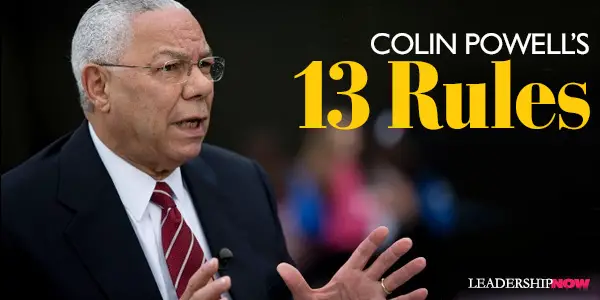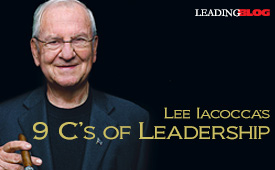Colin Powell's 13 Rules

COLIN POWELL has written a valuable memoir. It Worked For Me: In Life and Leadership is a collection of lessons learned and anecdotes drawn from his life. The 44 stand-alone chapters are an easy read and the stories make good points. The theme of the book is that it is all about people and relationships.
The book begins with his 13 Rules and why he has hung on to them over the years. Here they are with some of his thoughts on each:
- It ain't as bad as you think. It will look better in the morning. This rule reflects an attitude and not a prediction. I have always tried to keep my confidence and optimism up, no matter how difficult the situation. Things will get better. You will make them better.
- Get mad, then get over it. I’ve worked hard over the years to make sure that when I get mad, I get over it quickly and never lose control of myself.
- Avoid having your ego so close to your position that when your position falls, your ego goes with it. Accept that your position was faulty, not your ego. Loyalty is disagreeing strongly, and loyalty is executing faithfully.
- It can be done! Don’t surround yourself with instant skeptics. At the same time, don’t shut out skeptics and colleagues who give you solid counterviews.
- Be careful what you choose. You may get it. Don’t rush into things.
- Don't let adverse facts stand in the way of a good decision. Superior leadership is often a matter of superb instinct. Often, the factual analysis alone will indicate the right choice. More often, your judgment will be needed to select from the best courses of action.
- You can't make someone else's choices. You shouldn't let someone else make yours. Since ultimate responsibility is yours, make sure the choice is yours and you are not responding to the pressure and desire of others.
- Check small things. Success ultimately rests on small things, lots of small things. Leaders have to have a feel for small things—a feel for what is going on in the depths of an organization where small things reside. The followers, the troops, live in a world of small things. Leaders must find ways, formal and informal, to get visibility into that world.
- Share credit. People need recognition and a sense of worth as much as they need food and water. Share the credit, take the blame, and quietly find out and fix things that went wrong. Whenever you place the cause of one of your actions outside yourself, it’s an excuse and not a reason.
- Remain calm. Be kind. In the “heat of the battle”—whether military or corporate—kindness, like calmness, reassures followers and holds their confidence. Kindness connects you with other human beings in a bond of mutual respect. If you care for your followers and show them kindness, they will recognize and care for you.
- Have a vision. Be demanding. Purpose is the destination of a vision. It energizes that vision, gives it force and drive. It should be positive and powerful and serve the better angels of an organization.
- Don't take counsel of your fears or naysayers. Fear is a normal human emotion. It is not in itself a killer. We can learn to be aware when fear grips us and can train to operate through and in spite of our fear. If, on the other hand, we don’t understand that fear is normal and has to be controlled and overcome, it will paralyze us and stop us in our tracks. We will no longer think clearly or analyze rationally. We prepare for it and control it; we never let it control us. If it does, we cannot lead.
- Perpetual optimism is a force multiplier. Perpetual optimism, believing in yourself, believing in your purpose, believing you will prevail, and demonstrating passion and confidence is a force multiplier. If you believe and have prepared your followers, the followers will believe.
* * *

Like us on
Instagram and
Facebook for additional leadership and personal development ideas.
* * *




Posted by Michael McKinney at 09:58 PM
Permalink
| Comments (0)
| This post is about Leaders










